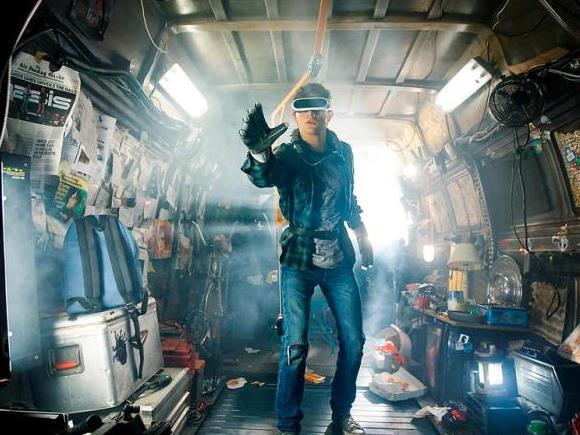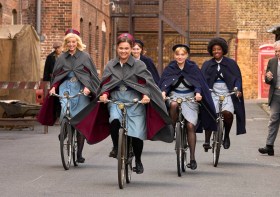Image of movie still Ready Player One via Roadshow.
A world steeped in ‘80s nostalgia isn’t difficult to imagine. In its triumphant use of Belinda Carlisle’s best-known track, Black Mirror’s San Junipero episode told us such indulgence would make heaven a place on earth. More than just the pondering of a TV show, however, that’s a sentiment Hollywood’s devotion to remakes, reboots, 30-years-later sequels and all-round nodding, winking and pilfering appears committed to proving true. It’s telling, though, that Charlie Brooker’s dystopian anthology confined its dance through the past to the virtual realm. Perhaps humanity doesn’t really want to return to a decade known for its excess, problematic politics, and far-from-equal positions on race and gender, but we certainly want to fill our heads with its pop culture.
Escaping the troubles of today, longing for a seemingly simpler time, viewing history with rose-coloured glasses, holding onto childhood favourites in a mass case of arrested development: call it whatever you like, but it’s fast becoming the cultural status quo. No shortage of films and television shows have helped twist society’s Rubik’s Cube to its current ‘80s-heavy configuration, though Ready Player One is the trend’s latest move. It’s a movie not only overflowing with more references to communally beloved properties than a comic book convention, but a Willy Wonka-like quest for glory through a Matrix-esque scenario, where ‘80s-dominated pop culture has become the chosen reality. More than that, the feature posits that proving that your recollection of, obsession with and affection for the decade’s entertainment commodities exceeds everyone else’s is all that anyone could and should possibly dream of.
That’s the task that Ready Player One’s protagonist has taken up, happily and willingly. It’s 2045, and only one thing matters to 18-year-old Wade Watts (Tye Sheridan, Detour): deploying his ‘80s knowledge to piece together puzzles within the virtual reality system known as the OASIS. With earth of the future a bleak place and his Ohio trailer park home even bleaker, he’s not alone in logging on and zoning out whenever he can. Still, when OASIS co-creator James Halliday (Mark Rylance, Dunkirk) passed away – not only placing hidden keys and Easter Eggs within his VR world, but offering up ownership to the first user to find them – Wade and the rest of humanity received an extra incentive to live their lives online.
Like them, the film spends the bulk of its time within the OASIS, charting Wade’s best efforts to emerge victorious. There, he’s known as Parzival, his glossy avatar keeping company with fellow egg hunters Art3mis (Olivia Cooke, The Limehouse Golem), Aech (Lena Waithe, TV’s Master of None), Sho (debutant Philip Zhao) and Daito (Win Morisaki, Japanese television’s Namonaki Doku). To win the game, Wade must also immerse himself in Halliday’s memories, which have been dutifully preserved as a digital archive. Cue an ‘80s overload, given that was the tech whiz’s heyday and fondest period. Throughout the OASIS, players have certainly taken the decade to heart, sporting Freddy Krueger and Jason Voorhees guises, driving DeLoreans and TRON light cycles, and holidaying on Dune’s Arrakis.
The references don’t stop there, and nor are they confined to the ‘80s, though the decade retains centre stage. Indeed, the cavalcade of nods to everything from Ferris Bueller’s Day Off and Michael Jackson’s ‘Thriller’ to Gundam and Mechagodzilla leave a stronger imprint than Ready Player One’s villain, corporate CEO Nolan Sorrento (Ben Mendehlson, Darkest Hour), who wants his employees to crack Halliday’s quest in order to fill the OASIS with advertising. Herein resides the movie’s main issue: with its narrative slight and familiar, and its sense of drama and threat muted, it relies upon its roster of recognisable properties – and the affection everyone has for them, especially off-screen – to provide interest. Alas, the feature deploys it all as little more than eye candy, presenting its content without engagement.
What results is the cinematic equivalent of “retweet doesn’t equal endorsement”, where representation doesn’t equal interrogation. Directed by Steven Spielberg, the film is based on the 2011 novel by Ernest Cline – and adapted for the screen by Cline (Mystery Science Theater 3000: The Return) with Zak Penn (The Avengers) – but it’s content to list favourite movies, games, bands and shows as a substitute for displaying personality. And while fandom takes many guises, a topic Cline also explored in his only other feature script, for 2009’s Fanboys, Ready Player One simply includes beloved icons rather than contemplating what draws audiences to them, or how they shape fans in turn. Even its most thoughtfully constructed scene, which recreates The Shining as one of Halliday’s games, just offers a depiction. It reminds viewers that they love Stanley Kubrick’s film, but it does little else. While there’s no such thing as a perfect journey through nostalgia, missing is Stranger Things’ evocation of mood, Red Oaks’ immersion in the everyday minutiae, or Brigsby Bear’s smart, sweet grappling with pop culture’s influence over identity.
Instead, Ready Player One serves up spectacle without substance, though its largely-CGI-animated action hardly dazzles. It’s fast, frenetic and functional; rendered in the right colour scheme; set to an expected array of ‘80s hits; and not only well-choreographed thanks to Spielberg’s ample experience, but places some of the director’s own greatest hits on display; however it possesses all of the allure of the Netflix menu. In fact, with its recognisable references lined up for quick, easy, shiny consumption, that’s what the viewing process resembles. With much of the movie’s content feeling as if it has been calculated by an algorithm, the parallels with the streaming platform extend further, but audiences may as well be scrolling through a catalogue, experiencing twinges of appreciation when they happen across something they know and like, but never delving any deeper.
★☆
Ready Player One
Director: Steven Spielberg
USA, 2018, 140 mins
Release date: 29 March 2018
Distributor: Roadshow
Rated: M
Actors:
Director:
Format:
Country:
Release:





